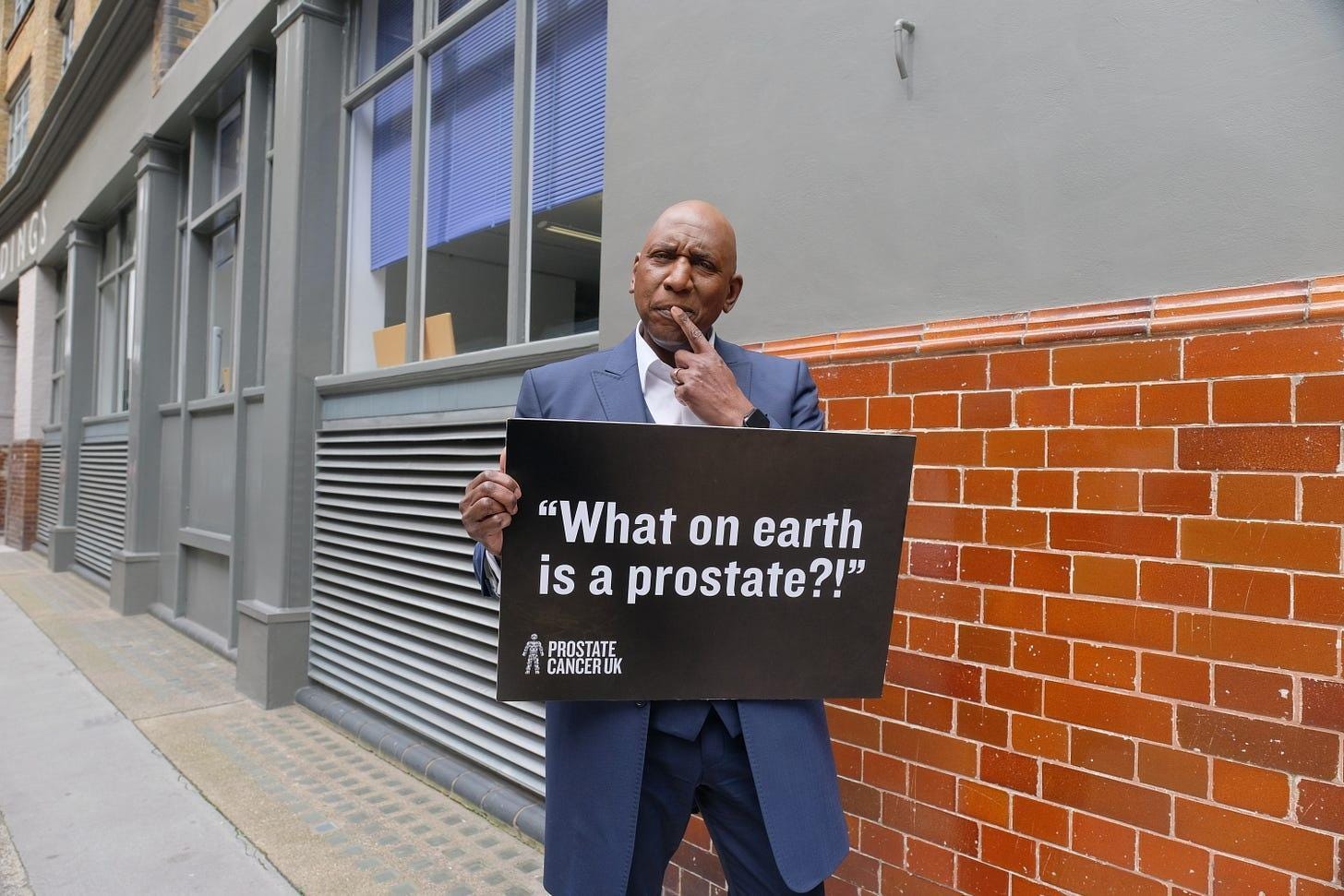UK Campaigns: Fighting Prostate Cancer on the Beaches, Landing Grounds. 'We Shall Not Surrender.' Could this be overkill?
Don't forget your stiff upper lips
(Editor’s note. There is a crusade going on in UK on behalf of prostate cancer patients as some high-profile patients share their stories with the public. Some prostate researchers may not have been prepared for their favorite disease to be thrust in the limelight as pols weigh in on what’s to be done. I wonder if prostate cancer politics will ever be front-page news in the US—short of a president being diagnosed and going public.
(Please support The Active Surveillor with a paid subscription. I soon will be announcing details of the premium webinar featuring top researchers.)
By Howard Wolinsky
The British public and officials, from Members of Parliament to current, high officials and a past Prime Minister, have gone on a Churchillian war footing to tackle prostate cancer, of all things.
I can almost hear echoes of Sir Winston Churchill’s 1940 historic speech leading into World War II: “We shall fight on the beaches, we shall fight on the landing grounds, we shall fight in the fields and in the streets, we shall fight in the hills; we shall never surrender.”
Stirring stuff. Is this what it will take to beat prostate cancer?
Churchill supposedly told a colleague after the historic speech: "And we'll fight them with the butt ends of broken beer bottles because that's bloody well all we've got!"
Today’s broken beer bottles include publicity campaigns, advertising, social media campaigns, memes, pushes for a national screening program, PSA testing, imaging, biomarker testing, and prostate cancer algorithms.
There’s a lot of well-intentioned rah-rah-ism. While some top doctors in the UK are grateful for the attention brought to their favorite topic, they privately told me the campaigns are a bit of overkill.
They’re basing on science and needs, they say. Could there be a bit of pushback because they don’t want the pols or the public how to do theur business? You decide.
I haven’t read this point-of-view in the prostate-fascinated British media.
There is a reluctance to slow the bandwagon and consider a more balanced view. Critics self-censor in fear of being seen as obstructionists and to avoid the hisses and boos from the public,
The origin story
British media seemed to be focused on PCa for years.
Prostate cancer has become front-page news as UK A-listers are coming out in droves to share their prostate cancer journeys. The media focuses on educating the public about research on diagnosis and treatment; anything on prostate cancer seems to sell papers and TV news.
They reported on favorite musicians, like Sir Elton John and Sir Rod Stewart, actors like Stephen Fry, and news presenters and football coaches sharing their prostate cancer stories. There even was a scare a year ago that King Charles had prostate cancer; he has some other cancer that he hasn’t disclosed, but also had BPH.
Olympic cyclist Sir Chris Hoy, a national hero, raised the visibility of prostate cancer starting in September 2023 when he announced that he had been diagnosed with lethal prostate cancer. Hundreds of thousands of men were inspired to take a 30-second test for their personal risk for PCa offered by Prostate Cancer UK. Others were inspired to get their PSA tests.
(Sir Chris Hoy)
Sir Chris, whose father and grandfather both had prostate cancer, was 48 when he was diagnosed with Stage 4 prostate cancer and given two to four years to live. He dug in and began to mobilize attention on the need for early detection of prostate cancer.
(I’ve interviewed experts in the UK who declined to talk about Hoy and how his case increased awareness.)
Most recently, in January, it was announced that prostate cancer, for two years running, has surpassed breast cancer to be the most commonly diagnosed cancer in Britain. There was a huge 25% increase in cases between 2019 and 2023.
(BTW, the same sort of increase is expected soon in the United States and many other countries as we head into what the journal The Lancet has called a “prostate cancer tsunami.”)
Even low-risk prostate and Active Surveillance make the front-page in UK:
In the US high-profile surveillance patients are virtualy unkown.
No Early Detection Plans for PCa
Any man in the UK can request a PSA test if he’s worried about prostate cancer. The doctor then has to counsel him about the pros and cons, and, like it is “claimed” in the US, it is a “shared decision-making” process whether to test or not. The NHS is not doing population screening for PCa to uncover cases systematically, experts noted.
Here’s UK policy: https://www.gov.uk/government/publications/prostate-specific-antigen-testing-description-in-brief
The NHS’ goal has been to avoid the PSA debacle that occurred in the US starting in the 1990s when too many men were found to have low-risk prostate cancers, triggering an epidemic of overdiagnosis and overtreatment accompanied by quality-of-lifestyle side effects, such as urine leakage and erectile dysfunction.
Joiurnalist Niles Coren describes in the story above how he had to fight to get his GP to order a PSA. (He’s on Active SUrveillance.)
At the same time, American men and their primary-care doctors were scared off from using PSAs, which led to underdetection and undertreatment of aggressive cancers, resulting in more men presenting with disseminated disease, although curiously, the mortality rates stabilized. It is now on the rise, the American Cancer Society said in 2023.
Britain and the rest of Europe may learn from what went wrong here and wisely develop the best practices on how to use PSAs along with MRIs and biomarkers to implement more effective screening and treatment strategies.
Meanwhile, national politicians and sports figures in the UK have stepped up to support Hoy’s efforts to address prostate cancer. That’s the British spirit a la World War II shining through.
Health Secretary Wes Streeting told the BBC he was "in awe" of Sir Chris's courage, positivity, and "wonderful message of hope,” adding that the "whole nation will be cheering him on now" and sending love.
Prostate Cancer Research has launched a campaign, Proactive for Your Prostate, “to change health policy and public attitudes, ensuring equitable access to prostate cancer screening.”
(British actor Colin McFarlane, who is on Active Surveillance, in an education campaign for Prostate Cancer UK.)
Former UK Prime Minister Rishi Sunak, now MP for Richmond and Northallerton, jumped on the bandwagon as an ambassador for Prostate Cancer Research. He said: “I am honored to become an ambassador for Prostate Cancer Research and support the charity’s mission to revolutionize diagnosis and treatment. Men tend to ignore pain hoping it’ll go away rather than going to see the GP, and that’s a part of the reason why prostate cancer is now the most commonly diagnosed cancer in males in the UK.”
Not sure what pain Sunak is referring to since most prostate cancer is diagnosed from PSAs, not symptoms:
The persistent mythology of urology: urinary symptoms and most prostate cancers
Other Voices
I have talked with several leading prostate cancer researchers in the UK. They’re of course not opposed to doing the right thing for prostate cancer patients. But I detected some skepticism about whether the current campaigns on PSAs are the right thing.
They preferred to talk anonymously.
One said: “The [Sir Chris Hoy] story has been blown out of proportion; <0.01% of men in his age group die of prostate cancer; it is very sad but a rare event and does not justify mass testing for younger men at all.
“Patients are free to ask for a PSA or want to discuss this with a GP, but there is no reason or rationale for a GP to offer or suggest one as part of standard care for no clear reason.”
Another renowned urologist told me: “What needs to be taken seriously here is to pay attention to family history of prostate cancer. When a man is diagnosed with the disease, he needs to inform his male first-degree relatives, and in particular his sons, and advise them to request testing from the age of 40 years, which is entirely justified. That simple targeted action could save lives and may have avoided, for instance, Chris Hoy presenting late with advanced disease.
“Furthermore, they can be referred for clinical genetics counseling if appropriate, and possibly genetic testing to assess the risk and any evidence of inherited mutations such as the BRCA1 and BRCA2 genes, which can also affect female members of the family with breast cancer. Few prostate cancers are lethal, and the ‘art’ and ‘Holy Grail’ is to catch them early by targeting the men at risk and identifying ‘lethality features’ that will guide timely treatment. Others without these features need to be managed, followed up, and kept in a ‘window of curability’ to avoid both overtreatment and undertreatment if their disease changes over time.”
(Note: There are some controversy now about whether BRCA1 mutations are associated with prostate cancer.)
Good intentions
So what to do when facing a tidal wave of good intentions? We’ll see what happens in the UK. Maybe in the end, they’ll develop a model that proves out and can be adopted everywhere.
What else is making PCa news?
—ASPI Session: Sorting Out Biomarkers;: A Guide for Patients on Active Surveillance.
PSAs, MRIs, and biopsies each tell part of the story on prostate cancer. But increasingly, biomarkers are playing a role in making decisions on Active Surveillance vs. treatment for men with lower-risk prostate cancer. The program features Jonathan Tward, MD, PhD, an international authority on biomarkers.
The webinar will be held from noon to 1:30 p.m. Eastern on Saturday, March 29, 2025. To register, go to: https://zoom.us/meeting/register/wsESZAXeR8Shp7FU60FHvg
Please send questions in advance to: contactus@aspatients.org








Thanking you Howard for keeping us men abreast of all things Prostate.